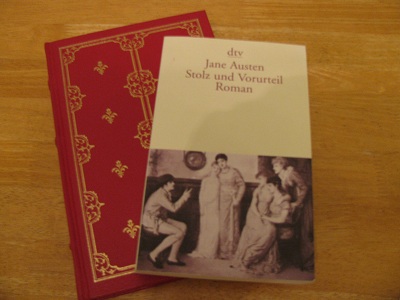Sonderling Sunday – Stolz und Vorurteil, Kapitel Drei
It’s time for Sonderling Sunday! That time of the week when I play with language by looking at the German translation of children’s books, or, in this case, of an English classic, Pride and Prejudice.
Last time I looked at Stolz und Vorurteil, we covered Chapter Two, so this time we are on Kapitel Drei. This begins on page 8 in my English edition, Seite 12 auf Deutsch.
“assistance of her five daughters” = Unterstützung ihrer fünf Töchter
“satisfactory description” = befriedigende Beschreibung
“barefaced questions” = unverblümten Fragen (“unveiled questions”)
“ingenious suppositions” = raffinierten Spekulationen (“refined speculations”)
“distant surmises” = unbestimmten Vermutungen (“vague conjectures”)
“wonderfully handsome” = erstaunlich gutaussehend
“extremely agreeable” = außerordentlich sympathisch
“easy, unaffected manners” = ungezwungenes, natürliches Wesen (“informal, natural ways”)
“with an air of decided fashion” = mit einem Auftreten von unzweifelhafter Lebensart
(“with an occurrence of undoubtful life-art”)
“noble mien” = vornehme Haltung
“a fine figure of a man” = einen stattlichen Mann (“a stately man”)
“admiration” = Bewunderung
“his manners gave a disgust” = sein Benehmen einen Abscheu hervorrief
“which turned the tide of his popularity” = der das Blatt seiner Beliebtheit wendete
(“which the page of his belovedness turned”)
“forbidding, disagreeable countenance” = abstoßendes, übellauniges Gesicht
(“repulsive, ill-tempered face”)
“unreserved” = freimütig (“free-speaking”)
“scarcity of gentlemen” = Mangel an Herren
“standing about by yourself in this stupid manner”
= so stumpfsinnig allein herumstehen
(“so stupidly alone around-stand”)
“fastidious” = anspruchsvoll (“demanding-full”)
“tolerable” = passabel
“wasting” = verschwendest
“lively, playful disposition” = lebhaftes, spielerisches Naturell
“anything ridiculous” = allen Absurden
“which had raised such splendid expectations”
= das so glänzende Erwartungen geweckt hatte
(“that so shiny expectations waked had”)
“sprained his ankle” = einen Knöchel verstaucht
“any description of finery” = jegliche Beschreibung von Putz
“shocking rudeness” = empörenden Unverschämtheit (“outrageous insolence”)
“so high and so conceited” = so überheblich und eingebildet
And that’s the end of Chapter 3.
There were lots of fun, descriptive words in this section. The next time you see einen stattlichen Mann, who is erstaunlich gutaussehend and außerordentlich sympathisch, for whom you have much Bewunderung, you’ll know how to give a befriedigende Beschreibung!


